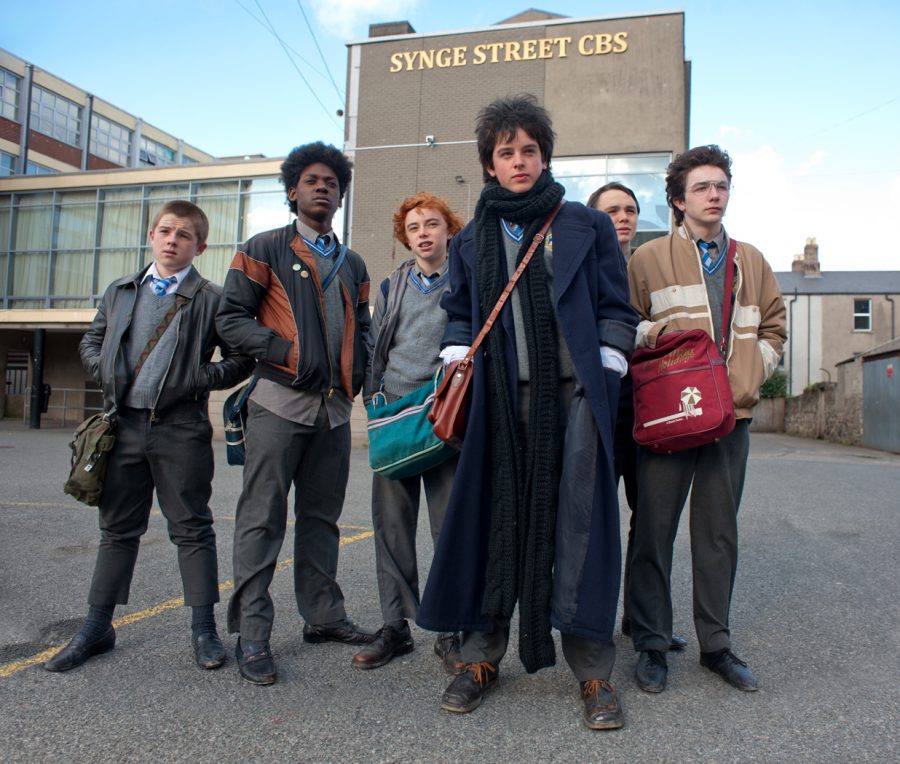‘Sing Street’: A dull coming-of-age tale told in vibrant technicolor
First time actor Ferdia Peelo-Walsh was selected for the role of Conor after a six-month hunt throughout Ireland for fresh, young talent.
April 25, 2016
Set in Dublin during the 1980s, director John Carney’s “Sing Street” tells the story of 14-year-old Conor, played by newcomer Ferdia Walsh-Peelo, as he embraces the colorful world of new-wave music to escape the dreariness of Catholic school, economic depression and his parents’ dysfunctional marriage.
Conor forms a band to find his confidence and win over the beautiful 15-year-old Raphina, played by Lucy Boynton. As he becomes more immersed in the music scene, the audience is pulled into vibrant flights of fancy that both parody and pay homage to the unique, do-it-yourself aesthetic of the era. This fun, quirky nostalgia is one of the film’s few strengths.
Unfortunately, the attempt to meld comedy, music and sober realism does not fully work. The brief forays into the world of Conor’s quarreling parents and his school’s fundamentalist headmaster seem to demand that the audience take the film more seriously, but it fails to explore these characters’ situations in any depth.
As a result, Conor’s parents and his headmaster are mere stereotypes of authoritarianism. We are expected to shudder at the brief glimpses into their internal lives but are not allowed to be close to them in any way. Even though “Sing Street” is about a child, its perspective need not be childish or one-dimensional.
Moreover, “Sing Street” emphasizes the homophobia at Conor’s school early on but only to milk a few cheap laughs from the audience. The film features no gay characters and ignores the issue after this false start.
Similarly, when Conor and his friends enlist Ngig, played by Percy Chamburuka, to play keyboard in their band, it’s only as a foil for racist humor. After a few cringeworthy jokes, he is relegated to the backdrop of the band’s music videos, never to be heard from again.
As Conor’s not-so-motley crew of young musicians grows in talent, they take a whirlwind tour through the various subcultures of the 1980s’ musical scene, replete with matching fashion statements. Before long, Conor’s ultra-cool pop materialism has won him Raphina’s admiration. Who would have guessed?
Meanwhile, Conor takes cliched advice about women from his seemingly sage older brother, Brendan, played by Jack Reynor. Brendan is a college dropout who stays home and smokes pot. Conor doesn’t seem to disagree when Brendan accuses their sister, Ann, played by Kelly Thornton, of being a conformist peon because she would rather study and attend school than listen to rock ‘n’ roll with them. Much like Ngig, Ann has virtually no dialogue.
Overall, this is a deeply obnoxious boys’ club of a film. Given that its central focus seems to be on misfits who fight to reclaim their identity, the film is painfully whitewashed, male and heteronormative, even though the new-romantic musical scene it examines was a culture of gender-benders.
“Sing Street” makes shallow attempts to flaunt images of social upheaval, yet the only struggle that matters is a laughable adolescent angst clearly incapable of acknowledging the existence of anything outside of its own ego.
While some may find the cheap laughs and colorful dance routines charming, the tone of Conor’s flat, materialistic fantasies is just as troubling as the poorly examined social context in which the film takes place. Period films are an opportunity for timeless issues to be explored in new contexts. There is no value in a period setting merely for the style that it offers, unless that style can be complemented with substance—something “Sing Street” lacks.








